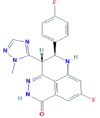Poly (ADP-Ribose) Polymerase Inhibitors: Talazoparib in Ovarian Cancer and Beyond
- PMID: 32215876
- PMCID: PMC7221042
- DOI: 10.1007/s40268-020-00301-8
Poly (ADP-Ribose) Polymerase Inhibitors: Talazoparib in Ovarian Cancer and Beyond
Abstract
Genetic complexity and DNA damage repair defects are common in different cancer types and can induce tumor-specific vulnerabilities. Poly(ADP-ribose) polymerase (PARP) inhibitors exploit defects in the DNA repair pathway through synthetic lethality and have emerged as promising anticancer therapies, especially in tumors harboring deleterious germline or somatic breast cancer susceptibility gene (BRCA) mutations. However, the utility of PARP inhibitors could be expanded beyond germline BRCA1/2 mutated cancers by causing DNA damage with cytotoxic agents in the presence of a DNA repair inhibitor. US Food and Drug Administration (FDA)-approved PARP inhibitors include olaparib, rucaparib, and niraparib, while veliparib is in the late stage of clinical development. Talazoparib inhibits PARP catalytic activity, trapping PARP1/2 on damaged DNA, and it has been approved by the US FDA for the treatment of metastatic germline BRCA1/2 mutated breast cancers in October 2018. The talazoparib side effect profile more closely resembles traditional chemotherapeutics rather than other clinically approved PARP inhibitors. In this review, we discuss the scientific evidence that has emerged from both experimental and clinical studies in the development of talazoparib. Future directions will include optimizing combination therapy with chemotherapy, immunotherapies and targeted therapies, and in developing and validating biomarkers for patient selection and stratification, particularly in malignancies with 'BRCAness'.
Conflict of interest statement
Stergios Boussios declares that he has no conflict of interest. Charlotte Abson declares that she has no conflict of interest. Michele Moschetta declares that he has no conflict of interest. Elie Rassy declares that he has no conflict of interest. Afroditi Karathanasi declares that she has no conflict of interest. Tahir Bhat declares that he has no conflict of interest. Faisal Ghumman declares that he has no conflict of interest. Matin Sheriff declares that he has no conflict of interest. Nicholas Pavlidis declares that he has no conflict of interest.
References
-
- Siegel RL, Miller KD, Jemal A. Cancer statistics, 2017. CA Cancer J Clin. 2017;67:7–30. - PubMed
-
- Kehoe S, Hook J, Nankivell M, Jayson GC, Kitchener H, Lopes T, et al. Primary chemotherapy versus primary surgery for newly diagnosed advanced ovarian cancer (CHORUS): an open-label, randomised, controlled, non-inferiority trial. Lancet. 2015;386:249–257. - PubMed
-
- Banerjee S, Kaye SB. New strategies in the treatment of ovarian cancer: current clinical perspectives and future potential. Clin Cancer Res. 2013;19:961–968. - PubMed
-
- Szakács G, Paterson JK, Ludwig JA, Booth-Genthe C, Gottesman MM. Targeting multidrug resistance in cancer. Nat Rev Drug Discov. 2006;5:219–234. - PubMed
Publication types
MeSH terms
Substances
LinkOut - more resources
Full Text Sources
Medical
Miscellaneous


